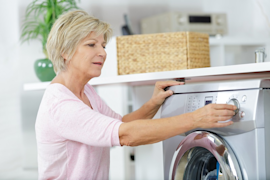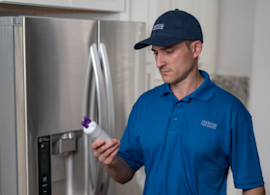Kenmore HE2 front-load washer error codes

These error code explanations can help you diagnose a problem with your Kenmore HE2 or Kenmore HE2 Plus front-load washer.
When the electronic control board in your washer detects a problem, an error code flashes in the control panel display. Follow the tips listed in the Kenmore HE2 and Kenmore HE2 Plus troubleshooting chart shown below to diagnose and repair the problem.
To find repair parts you need to fix a failure, search for your model number to find a complete list of replacement parts for your Kenmore HE2 or HE2 Plus washer.
For repair how-to help, visit the PartsDirect repair help section, which includes repair help for washing machines, other major appliances, lawn and garden equipment, garage door openers, vacuum cleaners and more.
Main control board EEPROM error
The Electrically Erasable Programmable Read-Only Memory (EEPROM) on the main electronic control board is corrupted. Unplug the washer for 5 minutes, restore power and see if the code clears. If not, the replace the main electronic control board.
Motor control board failure
Unplug the washer and check the wire harness connections between the motor control board and the main electronic control board. Reconnect any loose wires or replace the wire harness if damaged. If the wire connections are okay, replace the motor control board.
Not filling
Make sure the water supply faucets behind the washer are fully open. Check the water fill lines for kinks or freezing in the winter. Check the water inlet valves. If the valves don't open when activated, replace the water inlet valve assembly.
Will not drain
The washer failed to drain within 8 minutes. Check the washer drain path for a clog or restriction. Clear the large item filter in the drain pump. If the drain pump doesn't drain the water when activated, replace it.
Door lock failure
Unplug the washer and check the wiring harness connections between the door lock assembly and the main control board. Reconnect any loose wires or replace the wire harness if damaged. If the wire connections are okay, replace the door lock assembly.
Heating element failure
Unplug the washer and check the wire harness connections between the heating element and the main control board. Reconnect any loose wires or replace the wire harness if damaged. If the wire connections are okay, measure the resistance with a multimeter. You should measure about 15 ohms of resistance through the heating element. Replace the heating element if you measure infinite resistance because that means the element is broken.
Water temperature sensor error
Unplug the washer and check the wire harness connections between the temperature sensor and the display control board. Reconnect any loose wires or replace the wire harness if damaged. If the wire connections are okay, replace the temperature sensor.
Drive motor tachometer error
Unplug the washer and check the wire harness connections between the motor control board and the drive motor. Check the wire harness connection between the motor control board and the main control board. Reconnect any loose wires or replace any damaged wire harness. If the wire connections are okay, replace the drive motor, which includes the tachometer as an internal component. If the problem continues, replace the motor control board.
Door switch error
The control detects that the door hasn't opened for 3 consecutive cycles or the door switch indicates that the door is open with the door lock engaged. If you've run 3 consecutive cycles without opening the door, open and shut the door to clear the code. If the door switch detects the door open while locked, push on the door to make sure it's completely closed. Unplug the washer and check the wire harness connections between the door lock/switch assembly and the main electronic control board. Reconnect any loose wires or replace the wire harness if damaged. If the wire connections are okay, replace the door lock/switch assembly.
Overflow
The drain pump runs constantly in an effort to drain the water and the door stays locked. If the washer is overfilled, unplug the washer to see if water continues to fill the tub. Shut off the water supply and replace the water inlet valve assembly if the washer fills while unplugged. If the washer is empty when this code appears, unplug the washer and replace the water level pressure switch because it isn't accurately detecting water level.
Communication error between the main electronic control board and the motor control board
Unplug the washer and check the wire harness connections between the main electronic control board and the motor control board. Check the wire harness connections between the motor control board and the drive motor. Reconnect any loose wires or replace any wire harness that you find damaged. If those wire connections are okay, check the wire connections between the door lock/switch assembly and the main electronic control board. Reconnect any loose wires or replace the wire harness if damaged. A bad door lock/switch also prevents the motor control board from getting power, resulting in the F28 code. Replace the door lock/switch assembly if damaged. The cabinet has grounding switches on the front and back. Defective grounding switches can trigger the F28 code. Check the wire harness connections on the grounding switches. Reconnect any loose wires or replace the wire harness if damaged. Replace the motor control board if the wire connections, door lock/switch assembly and grounding switches are all okay.
Door unlock error
Unplug the washer. To manually unlock and open the door, remove the bottom front service panel, reach up into the cabinet and pull down on the manual release tab on the bottom of the door lock/switch assembly. Then pull the door open. Check for foreign objects in the door lock receiver. Clear any debris or objects from the receiver. If the door lock receiver is clear, check the wire harness connections between the door lock/switch assembly and the main electronic control board. Reconnect any loose wires or replace the wire harness if damaged. If the wire connections are okay, replace the door lock/switch assembly.
Dispenser system failure
Unplug the washer and remove the top washer panel. Check the wire harness connections between the dispenser actuator and the main electronic control board. Reconnect any loose wires or replace the wire harness if damaged. If the wire connections are okay, check the actuator cam and levers. Replace any damaged linkage components. If the cams and levers are okay, replace the dispenser actuator.
Motor control board failure
Unplug the washer and check the wire harness connections between the motor control board and the drive motor. Reconnect any loose wires or replace the wire harness if damaged. If the wire harness connections are okay, replace the motor control board.
Drain pump relay failure on the main electronic control board
Unplug the washer and check the wire harness connections between the main electronic control board and the drain pump. Reconnect any loose wires or replace the wire harness if damaged. If the wire harness connections are okay, replace the main electronic control board because the drain pump relay failed.
Load inside the washer during the Clean Washer cycle
You can only run the Clean Washer cycle with the tub empty. Remove any clothes from the washer and restart the Clean Washer cycle. If you had no clothes in the washer when starting the Clean Washer cycle, then you'll likely need to replace the spin bearing because the bearing isn't allowing the spin basket to rotate smoothly. The spin bearing is a component of the outer tub and isn't available as a separate part. Replace the outer tub if the spin bearing failed.
Excessive suds
Excessive suds is detected during the cycle. The cycle goes into a suds kill routine by filling the tube with water and then tumbling the clothes. If this routine doesn't eliminate the suds, the control displays the Sd code. Use the right amount of high-efficiency (HE) detergent with future loads.
Most common symptoms to help you fix your washers
Choose a symptom to see related washer repairs.
Main causes: unbalanced load, loose spanner nut, worn drive block, broken shock absorber or suspension spring, debris in…
Main causes: bad lid switch or door lock, bad timer or electronic control board, wiring failure, bad water inlet valve a…
Main causes: clogged drain hose, house drain clogged, bad drain pump, water-level pressure switch failure, bad control b…
Main causes: leaky water inlet valve, faulty water-level pressure switch, bad electronic control board…
Main causes: water heater failure, bad water temperature switch, faulty control board, bad water valve, faulty water tem…
Main causes: lack of electrical power, wiring failure, bad power cord, electronic control board failure, bad user interf…
Main causes: no water supply, bad water valves, water-level pressure switch failure, control system failure, bad door lo…
Main causes: worn agitator dogs, bad clutch, broken motor coupler, shifter assembly failure, broken door lock, suspensio…
Main causes: broken lid switch or lid lock, bad pressure switch, broken shifter assembly, faulty control system…
Most common repair guides to help fix your washers
Effective articles & videos to help repair your washers
Use the advice and tips in these articles and videos to get the most out of your washer.

Find tips for using your washing machine efficiently to save energy and help reduce utility bills.…

Learn about all the convenient features on our Sears PartsDirect website that make your parts purchases easier.…

Get answers to frequently asked questions about Sears and Sears PartsDirect.…